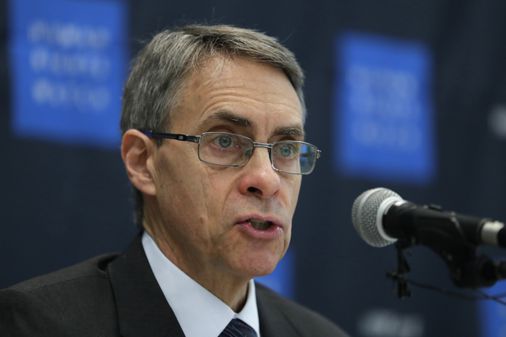“We all need to worry about that,” said Risse. “That’s why it’s especially important that Harvard live up to its motto — Veritas. What good is all the power and prestige associated with this institution if we don’t even live up to our own motto?”
Elmendorf could not be reached for comment. Harvard Kennedy School spokesperson James Smith said Elmendorf “decided not to make this fellowship appointment, as he sometimes decides not to make other proposed academic appointments, based on an evaluation of the candidate’s potential contributions to the Kennedy School.”
“We have internal procedures in place to consider nominations for fellowships and other appointments, and we do not discuss our deliberations about individuals who may be under consideration,” Smith said.
Roth has said he understood Harvard rejected his fellowship because his work has included criticisms of Israel. He wrote in an opinion piece in The Guardian on Tuesday that last summer, during a phone call with Elmendorf, the Kennedy School dean asked him if he had any enemies.
“I explained that of course I had enemies. Many of them,” Roth wrote. “That is a hazard of the trade as a human rights defender. I explained that the Chinese and Russian governments had personally sanctioned me — a badge of honor, in my view. I mentioned that a range of governments, including Rwanda’s and Saudi Arabia’s, hate me.
“But I had a hunch what he was driving at, so I also noted that the Israeli government undoubtedly detests me, too,” Roth added.
He then wrote that his fellowship was rejected two weeks later.
“If any academic institution can afford to abide by principle, to refuse to compromise academic freedom under real or presumed donor pressure, it is Harvard, the world’s richest university,” Roth wrote. “Yet the Kennedy School’s dean, Douglas Elmendorf, vetoed a human rights fellowship that had been offered to me because of my criticism of Israel. As best we can tell, donor reaction was his concern.”
The uproar reflects the national debate over academic freedom on college campuses, including a dispute at MIT, which faced a backlash in October 2021 after canceling a scheduled speech by a prominent scientist who had criticized policies aimed at increasing racial and gender diversity at universities.
In Harvard’s case, the fraught Israel-Palestinian conflict seemed to be at the center of the uproar. Human Rights Watch, where Roth was executive director for 30 years, has issued a number of reports saying that Israel appears to have committed war crimes against Palestinians.
Shraddha Joshi, an organizer for the Harvard College Palestine Solidarity Committee, said the reversal on Roth’s fellowship is “really disappointing but unfortunately not surprising.”
“This is the kind of action we have seen from Harvard before,” said Joshi. “It’s not surprising they would turn down someone who includes Palestine in their human rights work. It’s part of the larger trend we have been trying to organize against.”
Risse’s center reached out to Roth to recruit him for a fellowship last year and Roth “accepted in principle,” Roth wrote in the Guardian piece. Risse then submitted the fellowship to Elmendorf, who rejected the proposal, Risse wrote in an e-mail to “friends of the Carr Center and from around Harvard.”
“My subsequent conversation with Ken Roth to explain this decision to the extent I could was one of the lowest moments in my professional life,” Risse said in the e-mail.
The Nation first reported that Roth had lost his fellowship.
In November, Roth was named a fellow at the University of Pennsylvania after the Harvard rejection. In an interview published on the university’s website, he said his first priority for the role is writing a book “to answer the question of how a relatively small group of people moves governments around the world.”
Jonathan Friedman, with the free expression group PEN America, said he is worried about the message Harvard’s decision sends to other colleges and universities.
“There is also a potential ripple across the world of human rights scholarship because it send an alarming signal for those criticizing governments around the world that their commentary could earn them enemies and ultimately lead to restrictions on future careers in academia,” Friedman said. “That’s an unsettling message when we think about American universities, which are meant to be beacons of free speech and democracy in the world.”
Liz Jackson, senior staff attorney at Palestine Legal, a Chicago organization that works to protect the rights of people who speak out for Palestinian freedom, said that the Harvard move is not an outlier. She said people often face harassment or punishment for speaking about Palestine on college campuses.
“We call it the Palestine exception to free speech and that’s unfortunately routine,” Jackson said.
A group of about 45 Harvard Kennedy School alumni of Palestinian origin are calling on the university to reinstate Roth’s fellowship. The group also wants to see the Kennedy School name a new dean “who is truly committed to academic freedom,” the HKS Palestinian Alumni Collective wrote in an open letter Tuesday.
“Our collective experiences with institutionalized anti-Palestinian discrimination at HKS have included the administration’s support for Israeli state-sponsored violence and apartheid,” the group said in the letter. “We are deeply dismayed that this support continues.”
Travis Johnson, Harvard’s student body co-president, told the Globe that Elmendorf’s decision sets “a dangerous precedent.”
“What troubles me is Harvard prides itself on academic freedom,” Johnson said.
Hilary Burns can be reached at [email protected]. Follow her on Twitter @Hilarysburns.



